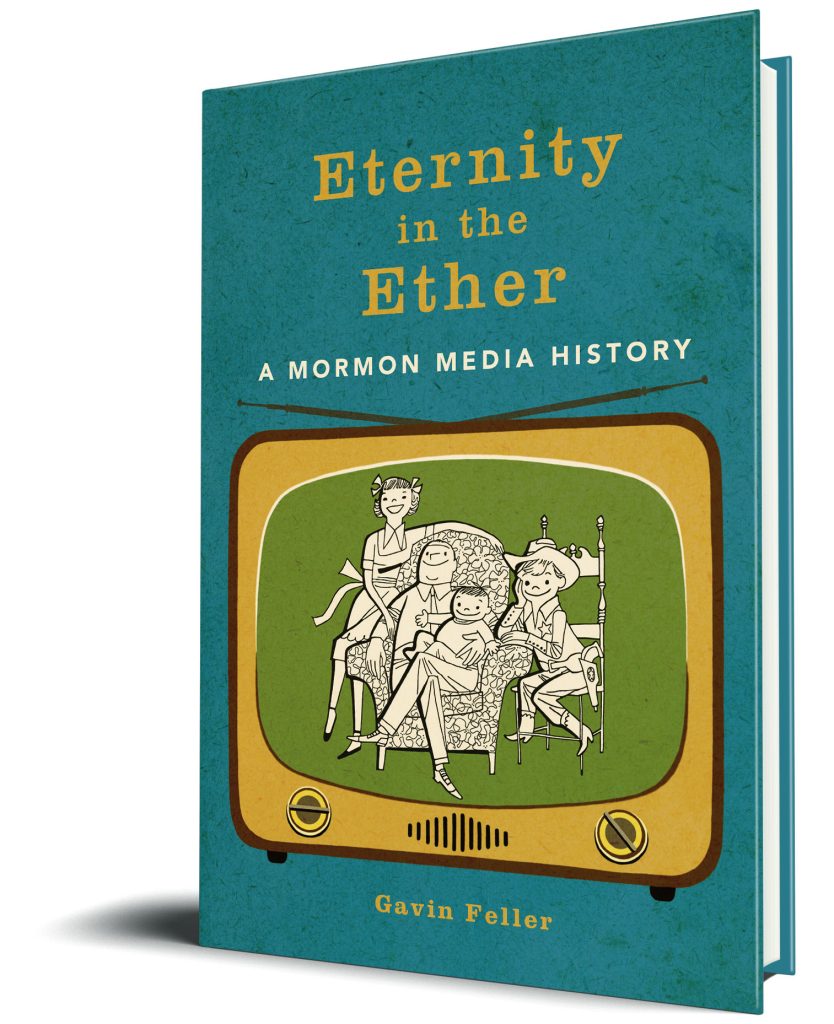Gavin Feller, author of Eternity in the Ether: A Mormon Media History, answers questions on his scholarly influences, discoveries, and reader takeaways from his new book.
Q: Why did you decide to write this book?
In all of my graduate courses in media and communication, I continually found myself applying what I was learning and discovering to Mormonism. It’s the religious tradition in which I was raised, so it has personal significance, and it’s something I know well through firsthand experience. So many of the theoretical questions I grappled with as a young scholar were not yet answered in the context of Mormonism. I quickly learned that the history of Mormon media was rich grounds for complex questions at the heart of both media theory and religious studies. Although the Church of Jesus Christ of Latter-day Saints has an impressive capacity for keeping its own history, there were no histories of the institution’s media adoption; some scattered articles and book chapters existed, but no rigorous scholarly study. So, I had what I needed to justify writing the book: a set of interesting interdisciplinary research questions and a field of unturned stones.
Q: Who were your biggest influences?
I’ve been most heavily influenced by PhD mentor, John Durham Peters. And I mean that in a professional and personal sense. His kindness, care, wisdom, and expansive thinking were incredibly inspirational for me during my time with him at the University of Iowa (before he moved to Yale). Other grad school mentors, such as Jenna Supp-Montgomerie and Melissa Tully, made a big impact on the way I approached research and writing as well as my bigger career choices. I’ve also been really inspired by provocative scholars like Marshal McLuhan and James Carey. People who ask big questions and aren’t afraid to get some things wrong have always got me excited.
Q: What is the most interesting discovery you made while researching and writing your book?
I learned a lot about the particularities of Mormon history and of media history more broadly, but the most interesting discovery I made is that media are incredible tools of revelation. And I mean that in the broadest sense of the term, including the secular sense. The choices we make about media technologies—for instance, when and how we will and won’t use a certain technology—is itself a revelatory process in which we learn not just about the affordances and limitations of the medium but also about ourselves. Media reveal things about us to ourselves in ways that are not possible otherwise. It’s similar to how parenthood works—raising kids is the quickest way to uncover your deepest flaws.
Q: What myths do you hope your book will dispel or what do you hope your book will help readers unlearn?
A big part of the Mormon story, particularly as its articulated by the Church of Jesus Christ of Latter-day Saints as an institution, is a history of innovative media adoption. The story I tell is far more nuanced. It includes a lot of unforeseen ethical comprises, failures, bottom-up creativity, and perhaps above all, change. There is far less consistency and foresight than most Latter-day Saints are led to believe. And that’s exactly why Mormon media history is so fascinating! It’s messy and complex. Learning about Latter-day Saints’ ambivalent relationship with media and American culture has been a wild ride with unexpected twists and turns.
Q: What is the most important idea you hope readers will take away from your book?
Media technologies are agents of compromise. They are not neutral channels. Our encounters with them always, inevitably, result in compromises. And compromise here is not just a negative experience or a failure, nor is it about a mutually beneficial agreement, as we often think about it. Religious institutions don’t simply add new communication technologies to their communities and worship services like items in a grocery cart. Nor do the latest technical innovations sweep over religion as an unstoppable force. I think about compromise as a puzzle that’ll never be solved. I like Oxford’s definition of comprise as “a solution to a problem in which two or more things cannot exist together as they are, in which each thing is reduced or changed slightly so that they can exist together.” I would add that existing together does not mean it’s a win-win. That is kind of the philosophical conundrum of the human condition. I hope the book can give us the relief and reassurance we need as we struggle to co-exist with the technical devices and the conditions we ourselves have created. The point of the book is that we probably won’t figure it out and that’s ok.
Q: What do you like to read/watch/or listen to for fun?
I mostly listen to podcasts and audiobooks during the day and watch TV and films at night, when I can. Right now, I’m on a self-discipline and bodily mastery kick. So, I’m really into non-fiction survival and sports dramas. I love listening to the podcast Against the Odds, for example. At the surface level it’s powerful stories of human triumph. At a deeper level, it’s a meditation on the performance of masculinity that I guess I need right now. I’m also listening to the podcast American Scandal a lot these days—maybe because it gives me hope for some eventual justice in the face of all the injustices I see around me here living in Brazil. On lighter days, The Office and Seinfeld are staples. Nerd note: this is all stuff I consume on my own. It’s interesting how different my answer would be if I said what I read/watch/ and listen to with other people!

